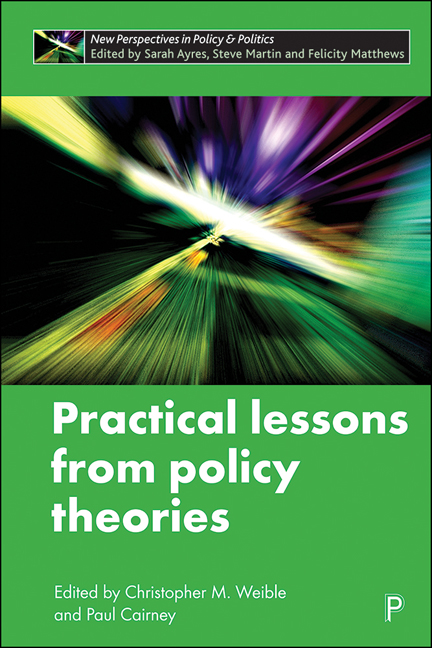Book contents
- Frontmatter
- Contents
- List of figures and tables
- Notes on contributors
- one Purposes and paths in drawing practical lessons from policy theories
- two Three habits of successful policy entrepreneurs
- three Narratives as tools for influencing policy change
- four Using cultural theory to navigate the policy process
- five The lessons of policy learning: types, triggers, hindrances and pathologies
- six Practical prescriptions for governing fragmented governments
- seven Drawing practical lessons from punctuated equilibrium theory
- eight Policy design and the added-value of the institutional analysis development framework
- nine Why advocacy coalitions matter and practical insights about them
- ten Reflections and resolutions in drawing practical lessons from policy theories
- Index
six - Practical prescriptions for governing fragmented governments
Published online by Cambridge University Press: 05 January 2022
- Frontmatter
- Contents
- List of figures and tables
- Notes on contributors
- one Purposes and paths in drawing practical lessons from policy theories
- two Three habits of successful policy entrepreneurs
- three Narratives as tools for influencing policy change
- four Using cultural theory to navigate the policy process
- five The lessons of policy learning: types, triggers, hindrances and pathologies
- six Practical prescriptions for governing fragmented governments
- seven Drawing practical lessons from punctuated equilibrium theory
- eight Policy design and the added-value of the institutional analysis development framework
- nine Why advocacy coalitions matter and practical insights about them
- ten Reflections and resolutions in drawing practical lessons from policy theories
- Index
Summary
Introduction
Collective action dilemmas, or the misalignment of individual incentives and desired collective outcomes, are prevalent across every scale of social interaction. These dilemmas are exacerbated in systems of fragmented authority or overlapping jurisdictions. The intractable, ‘wicked problems’ – climate change, global terrorism, health crises, crime, or poverty – facing governments are seldom contained within a jurisdiction and require interorganisational efforts to address them (Head and Alford, 2015; Martin and Guarneros-Meza, 2013), although even many common governing tasks are not suited to hierarchies. Whether contracting out social services, restoring an ecosystem in a shared watershed, lowering barriers to international trade, or coordinating sustainability activities across a municipality, policymakers confront obstacles to collaboration that hinder more efficient and effective governance.
As centralised versus decentralised approaches to deal with fragmentation have long been debated (Lyons and Lowery, 1989; Ostrom et al, 1961), collective action theories have explained how semi-autonomous governments can work together and overcome problematic externalities or ‘spillovers’ (that is, positive or negative consequences of an activity that affect third parties) that arise from fragmentation, while preserving local autonomy that can spur innovation and limit the expansion of bureaucracy.
The Institutional Collective Action (ICA) framework (Feiock, 2007; 2013) has emerged as an analytical lens for understanding collaboration in fragmented governance. ‘ICA dilemmas’, or situations in which an authority's incentives do not align with collectively desired outcomes, arise from spillovers of policy choice and design that transcend jurisdictions. ICA dilemmas stemming from fragmentation can lead to inefficient behaviour, such as free riding and service duplication, as well as normatively undesirable outcomes such as urban sprawl (Jimenez, 2016).
ICA dilemmas are ubiquitous in governance. They manifest horizontally between governmental units at the same level as the consequences of one unit's actions spill over to another's jurisdiction (for example, in interlocal relations); vertically as a governmental unit at one level pursues complementary or conflicting actions to those pursued at a higher or lower level (for example, in US state– local relations); and functionally between subunits of a unitary authority within a service provision area such as sustainability policy implemented by multiple departments within a municipal government (Feiock et al, 2017).
- Type
- Chapter
- Information
- Practical Lessons from Policy Theories , pp. 105 - 130Publisher: Bristol University PressPrint publication year: 2021



